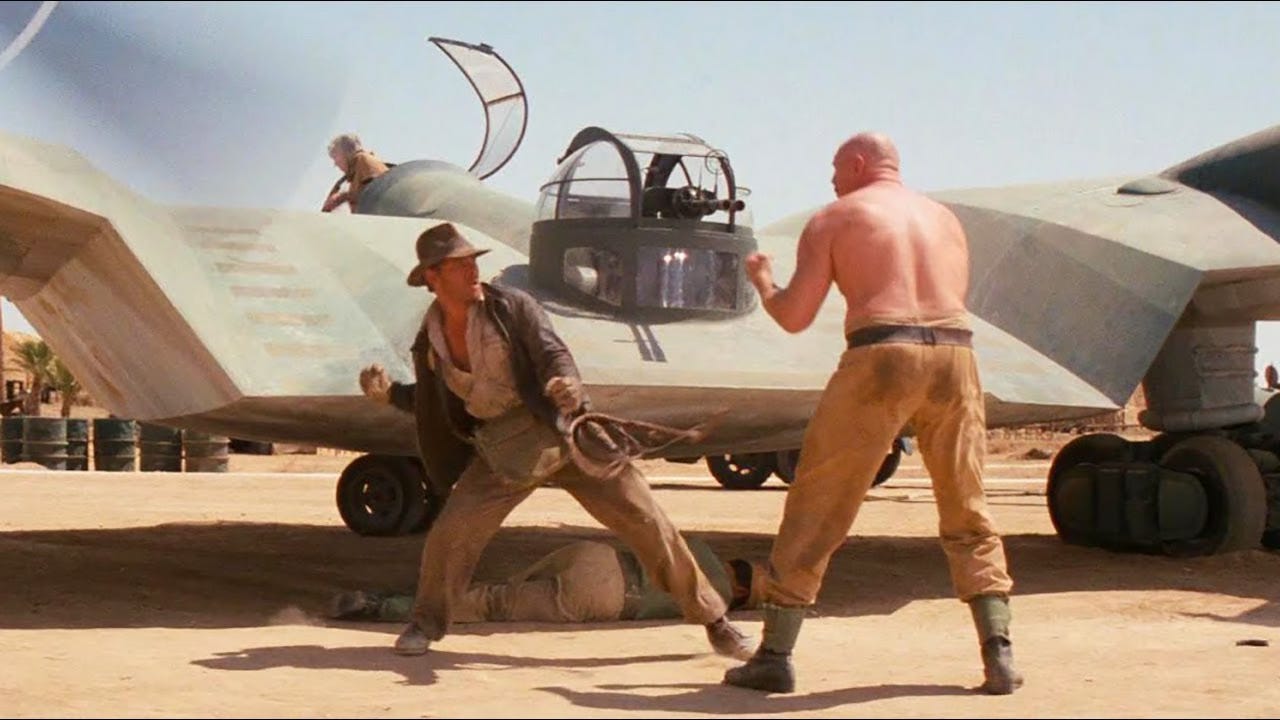💥 You only have to destroy the Death Star
The difference between storytelling goals and stretch goals.
In 2009, John made a short post on matching the stakes of an epic story to what’s possible for the hero to achieve. Expanding on some of those thoughts, we’re including some comments about Raiders of the Lost Ark from a deep dive in Scriptnotes Episode 73.

Something I try to remind myself when writing epic-themed stories — which is a lot, recently — is that my hero doesn’t have to fix The Big World Problem by the time the end credits roll. Rather, they just need to achieve the small, specific goal I’ve set out for them. They only have to destroy the Death Star.
Yes, that task should be exceedingly difficult. But it’s several orders of magnitude away from The Big World Problem.
Darth Vader and the Empire are still very much kicking at the end of A New Hope. Nazis are alive and well at the end of Raiders, The Guns of Navarone, and every WWII epic you’ve seen. By the end of The Matrix, Neo has learned something of his powers, but the world is largely unchanged.
In fact, the rule seems to be that it’s only at the end of a trilogy that the hero really transforms the world. And you don’t get to make a trilogy unless the first one works. So make the first one at human scale.
Indy vs. Belloq: Made for each other
If ending WWII in Europe is the Big World Problem informing Raiders of the Lost Ark, what’s the human scale problem that Indiana Jones could actually tackle? Here’s an edited transcription of John and Craig’s conversation about why pitting Jones against Belloq hits that sweet spot.
Craig: Jones's passion for the object overrules his sense of self-preservation. He has an obsession. Belloq is his shadow in the best possible way: “Once again we see that there is nothing you can possess that I cannot take away.” We see the opposite of Indiana Jones; a guy that is ruthless and willing to kill because he has the same passion — he wants The Thing.
In that wonderful scene in the bar after Indiana Jones is drinking himself to death because he thinks Marion is dead, here comes Belloq: “Archeology is our religion, yet we have both fallen from the pure faith. Our methods have not differed as much as you pretend. I am but a shadowy reflection of you. It would take only a nudge to make you like me. To push you out of the light.”
These two men have something in common. What we start to feel when heroes and villains share an obsession is that the hero is not so much fighting a person to get a thing; they’re fighting themselves. Fighting Belloq all the way through is an externalization of what he’s fighting in himself.
John: By finding those sort of small moments where a character who you despise — Belloq — you feel this little glimmer of sympathy for him, for just a moment, as they throw Marion in to the Well of Souls. Obviously I feel much worse for her. But, “Oh, [the Nazis are] even dicks to him,” is sort of a great change.
Craig: His regret is lacking the humanity of Indiana Jones’s regret when he thinks Marion dies. His regret is, “Ooh, that’s a shame. That’s a waste of a beautiful thing.” Indiana was drinking himself to death because that was a waste of beautiful human that he loved. That’s where these two guys are different.
John: When Jones has his moment with the rocket-propelled grenade where he has Belloq pinned to this little rocky valley and says, “Let go of the girl or I’ll blow up the treasure.” It seems like he’s made his choice.
But Belloq talks him down, “I know you will not actually destroy this thing, this precious artifact.”
Craig: Belloq is saying, “If you blow it up you’re going to kill her, too. You’re going to kill all of it. You and I are just passing through history. This — this is history.”
And in the moment when Indiana Jones lowers his weapon, he’s not just saving Marion from being obliterated. He is giving himself over to the fact that this is not just an object. He is demonstrating faith that this is actually something bigger.
In a weird way, it’s a faith that Belloq has always had because minutes later when Belloq is preparing to open up the Ark, his Nazi cohort is saying, “I’m a little uncomfortable with this Jewish ritual.” But Belloq is completely into the Jewish ritual because Belloq is a believer. It’s just that Belloq is an immoral believer. He’s willing to do anything to get to the power inside. And now Indiana Jones is a believer, and that’s when he’s switched over.
John: The actual opening of the Ark releases big gruesome visions of the angels of death. There’s wonderful melting. It’s terrific. One could criticize that our actual hero has very little to do in this other than to say, “Oh, just don’t look at it.” But his hero’s quest, and his arc, has been to get him to that place, and to be the person who doesn’t get melted by god because he’s smart enough to know what not to do.
Craig: It’s the moment where he expresses the faith. When he tells Marion, “Shut your eyes,” he is saying, “I now believe that there is the power of god in this thing. That this is not an object. And if I believe in the power of god then I believe, in fact, that things like you and me are more important than a chest.”
Are you enjoying this newsletter?
📧 Forward it to a friend and suggest they check it out.
🔗 Share a link to this post on social media.
🗣 Have ideas for future topics (or just want to say hello)? Reach out to Chris via email at inneresting@johnaugust.com, Mastodon @ccsont@mastodon.art, or Threads @ccsont@threads.net
Stronger together
Though the WGA has called off its own picketing after reaching a tentative agreement with the AMPTP, you can still help SAG-AFTRA!
For ways you can support the SAG-AFTRA effort to negotiate a fair contract with the AMPTP, check their strike hub for more information.





